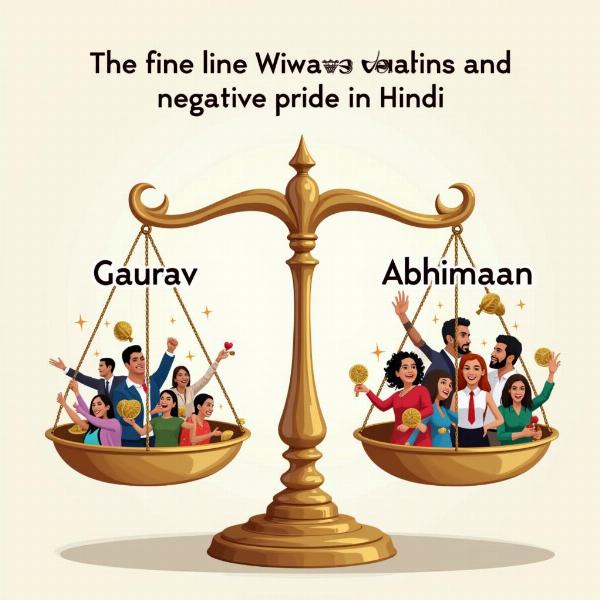Pride, a complex emotion with both positive and negative connotations, holds a significant place in Indian culture. Understanding its various nuances in Hindi is crucial for anyone seeking to delve deeper into the language and its cultural context. This article explores the “hindi meaning of pride” in detail, examining its different interpretations, cultural significance, and common usage.
Decoding “Gaurav” and “Abhimaan”: The Two Faces of Pride
In Hindi, “pride” is most commonly translated as “गर्व” (garv) or “अभिमान” (abhimaan). While both words convey a sense of self-respect and high regard, they differ subtly in their connotations. “Gaurav” generally represents a positive form of pride, associated with achievements, honor, and dignity. Think of the pride a parent feels for their child’s accomplishments, or the national pride evoked by a sporting victory. This is the kind of pride that motivates and inspires. “Abhimaan,” on the other hand, often leans towards a more negative interpretation, implying arrogance, egotism, and even vanity. It’s the kind of pride that can lead to conflict and strained relationships.
 Hindi Meaning of Pride: Gaurav vs. Abhimaan
Hindi Meaning of Pride: Gaurav vs. Abhimaan
Cultural Context of Pride in India
Pride plays a significant role in Indian society, interwoven with concepts of honor, family reputation, and social standing. From ancient epics like the Ramayana and Mahabharata to everyday social interactions, the concept of pride is deeply embedded in the Indian psyche. For example, “kul-gaurav” (family pride) is a powerful motivator, encouraging individuals to uphold the family’s honor and reputation.
What is the meaning of pride in Hindi?
Pride in Hindi can be translated as “गर्व” (garv) or “अभिमान” (abhimaan). “Garv” represents positive pride, associated with honor and dignity, while “abhimaan” often implies arrogance or egotism.
How do you say “proud of you” in Hindi?
You can express “proud of you” in Hindi as “मुझे तुम पर गर्व है” (mujhe tum par garv hai). This phrase directly translates to “I have pride in you” and is commonly used to express appreciation and admiration.
Pride has a fall: Meaning in Hindi
The proverb “pride has a fall” translates to “घमंड का अंत बुरा होता है” (ghamand ka ant bura hota hai) in Hindi. This emphasizes the negative consequences of excessive pride. pride has a fall meaning in hindi explores this concept further.
Navigating the Nuances: Examples and Usage
Understanding the subtle differences between “gaurav” and “abhimaan” is crucial for appropriate usage. For instance, saying “mujhe apne desh par gaurav hai” (I am proud of my country) expresses patriotic pride. However, using “abhimaan” in the same context would imply a sense of superiority or arrogance. Similarly, proud of u meaning in hindi and proud parents meaning in hindi demonstrate how context influences the choice between “gaurav” and “abhimaan”.
Dr. Anita Sharma, a renowned linguist specializing in Hindi, explains: “The choice between ‘gaurav’ and ‘abhimaan’ depends heavily on the context and the speaker’s intent. Using the correct word is crucial for effective communication and avoiding misunderstandings.”
Proud of Meaning in Hindi: Further Exploration
proud of meaning in hindi offers a more detailed examination of the various ways “proud of” can be expressed in Hindi, considering different contexts and relationships. This resource can be invaluable for anyone seeking to enhance their understanding of the nuances of the language.
Conclusion
Understanding the “hindi meaning of pride” goes beyond simply knowing the translation. It involves appreciating the cultural context, navigating the subtle differences between “gaurav” and “abhimaan,” and using the appropriate term in different situations. By grasping these nuances, one can gain a deeper understanding of the Hindi language and the rich cultural tapestry it reflects.
FAQ
-
What is the simplest way to say “pride” in Hindi? “Garv” (गर्व) is the most common and straightforward translation of “pride” in Hindi.
-
Is “abhimaan” always negative? While often associated with negative connotations like arrogance, “abhimaan” can also represent self-respect in certain contexts.
-
How do I express pride in my family in Hindi? You can say “mujhe apne parivar par gaurav hai” (मुझे अपने परिवार पर गर्व है), which translates to “I am proud of my family.”
-
Are there other Hindi words related to pride? Yes, words like “maan” (मान), “samman” (सम्मान), and “aan” (आन) are also related to concepts of pride, respect, and honor.
-
Why is understanding the nuances of “pride” in Hindi important? It allows for more accurate and culturally sensitive communication, avoiding potential misunderstandings.
Meaning-Hindi.in is your trusted partner for all your Hindi translation needs. We offer a wide range of professional translation services, specializing in business, legal, technical, website localization, educational, and specialized content. Our expert translators ensure accurate and culturally appropriate translations, bridging the language gap between Hindi and other languages. Contact us today for a free quote at [email protected] or call us at +91 11-4502-7584. Let Meaning-Hindi.in help you connect with your target audience effectively.